Thekchen Chöling, Dharamsala, HP, India - This morning Janis Martins Skuja of the Latvian Society for Tibet welcomed His Holiness the Dalai Lama to a webinar organised by a coalition of individuals and organizations from the Baltic States.
His Holiness responded,
“I have visited the Baltic States on several occasions. One of the reasons I visited Latvia more recently was to give teachings to Russian Buddhists. It happened that once, after I’d taught a group of Russians in Delhi, one of them told me that there were more people in Russia who’d like to attend, but who could not afford to come to India. I was moved. We looked into my giving teachings in Latvia, which was easier for Russians to reach. Latvians and their officials supported the idea and looked after me very well, for which I would like to express my deep appreciation.
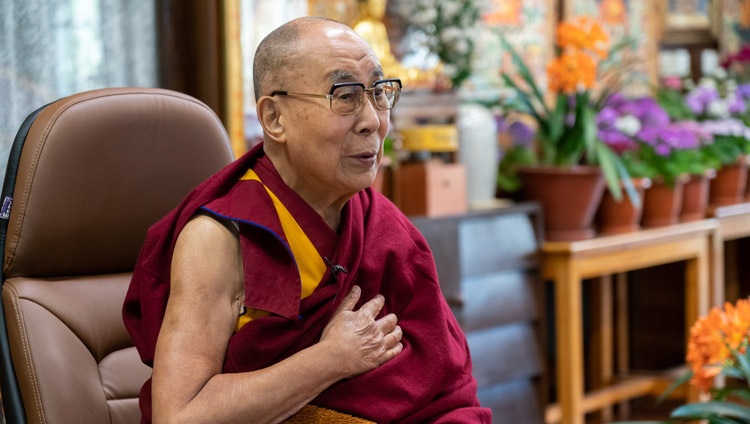
“Now, with regard to morals and ethics, according to various religious traditions, ethics spring from faith. However, we can also refer to secular ethics. These relate to the whole of humanity. All seven billion human beings alive today are essentially the same, and we have to live together.
“In the past we got caught up in war and violence. We spent time, effort and money on developing weapons—most unfortunate. And yet we are social animals. Scientists point out that we depend on the community in which we live and have a natural concern for the members of that community. They are the source of our happiness.
“Sometimes our sense of concern for the wider community has declined and we have focussed on a narrower group in terms of ‘us’ and ‘them’. This has led us to fight and kill each other. But today there are no grounds for thoughts of ‘us’ and ‘them’. All seven billion of us not only have to live together, we have to help each other. From this point of view ethics involves taking care of the whole of humanity here and now. It’s not about God or the Buddha, it means regarding all human beings as our brothers and sisters. It’s about cultivating warm-heartedness.
“These days, in addition to our general problems, we have to contend with threats like global heating that affect us all. In such circumstances it’s important that we learn to live happily and peaceably together. We have no need, for example, to develop yet more sophisticated or more powerful weapons. We need to live in peace, conscious of the oneness of humanity.
“And I believe the people of the Baltic States, Latvia, Lithuania and Estonia, have great potential to promote a widespread recognition of human brotherhood and sisterhood. When I was a child I learned about the outside world from illustrated books and magazines and I was aware of how a larger nation had exploited the Baltic States. Things changed and eventually I was able to visit.
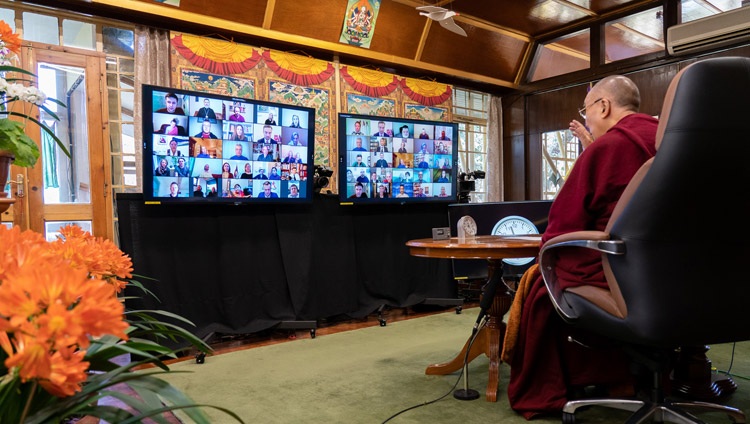
“What I want to stress is that ethics rooted in a sense of the oneness of humanity are a source of happiness. War is out of date. Weapons too are out of date and a waste of money and resources. I also have a feeling that smaller countries may have greater opportunities than larger ones to contribute to actual peace in the world.”
In answering questions from the audience in all three Baltic States His Holiness expressed concern for his brothers and sisters who have suffered in a multitude of ways during the Covid-19 pandemic. He voiced great admiration for the way doctors and nurses have looked after those in their care. He mentioned that as a Buddhist monk he prays every day that the ill will recover and that the pandemic will recede. He addresses his prayers especially to the goddess Tara and recites her mantra.
Asked how people can learn to transform themselves, His Holiness observed that human beings have particularly agile brains. We must, he suggested, no longer use them to dwell on divisions into ‘us’ and ‘them’. We must ensure that education talks more about basic human values—cultivating a concern for humanity as a whole.
“Modern education has largely material goals, but we can usefully learn from ancient Indian knowledge of the workings of the mind and emotions. Included in this understanding are non-violence and compassion, both of which we could fruitfully incorporate into our present education system.
“Many scientists today are examining mental health and taking an interest in methods for achieving peace of mind. Part of this involves emotional hygiene, a mental correlate of the physical hygiene with which we protect our health. It involves learning to tackle destructive emotions like anger and fear. It further entails nurturing constructive emotions like kindness and compassion.”
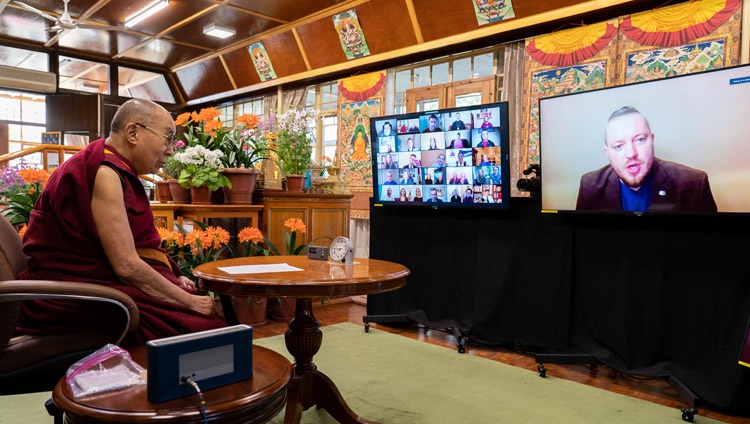
His Holiness observed that in the past many places were dominated by a military presence. However, today, as meaningful democracy continues to grow and with it genuine social concern, things are improving. Many members of the public wish to reduce the gap between rich and poor. Individuals are increasingly taking responsibility for the well-being of all.
People look to their own feelings and experiences to decide when to act rather than waiting for others to give orders or instructions. Feelings are part of the mind. Ancient Indian knowledge, as preserved in the Nalanda Tradition, provides detailed explanations of the workings of the mind and emotions. It is reproduced in several good books that can we can study to learn how to become more peaceful, calm-minded individuals.
His Holiness alluded to the tremendous growth in sources of information available today to everyone with a smart phone. He cautioned against being misled by distorted reports and the dangers of irresponsible free speech. He advised that as people become better educated and more discerning, those who peddle distorted information will be revealed and disgraced. Even great nations, he noted, can be seen to lie.
Whether we like it or not, he said, because we have to live together on this one planet, we need to realize that such differences as faith, colour or race are secondary when compared to the fact that we are all human beings. Because of this basic equality we have to reduce and eliminate the gap between rich and poor. We need society to be based on moral principles.
“I’m optimistic,” His Holiness remarked, “that things are changing for the better.”
Questioned about the place of Christianity and Buddhism in the 21st century, His Holiness discouraged too much reliance on old ways of thinking. He remarked that when he teaches Buddhism these days, he doesn’t just repeat what’s been said in the past. He commended taking a more scientific view in the light of reason. This doesn’t affect the core message of loving-kindness. For Christians, God, like a compassionate father, is the creator, making his children, all human beings, brothers and sisters.
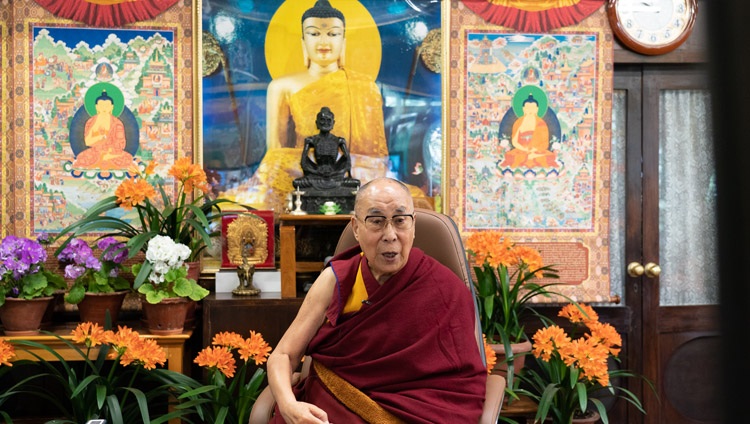
His Holiness mentioned that in his view the Tibetan tradition still includes too much meaningless ritual. He reiterated that however much their philosophical views may diverge, the central message of all religious traditions is the importance of loving-kindness. Where there is loving-kindness, forgiveness naturally follows. Being kind-hearted makes for happy individuals, happy families and happy communities. And training in kind-heartedness can be incorporated into general education.
His Holiness told someone who wanted to know how to confront challenges and difficulties that he followed the advice of an Indian master from the past. He recommended analysing the problem to discover if it can be resolved. If there’s a solution, that’s the course to follow. If there’s no solution and the problem cannot be overcome, the best thing is to let it be and accept the situation as it is.
In answering a question about the true purpose of life, His Holiness declared that a key factor is finding peace of mind, which contributes to happiness and good health. It’s important to recognize that emotions like anger and fear destroy peace of mind, whereas compassion and concern for others reinforce it. Therefore, it’s worth discovering how to tackle anger and how increase altruism. We need to use our intelligence. A source of guidance may be preserved in religious texts, but the advice it contains can be applied in an objective, secular manner.
Uldis Budrikis, a Latvian MP and Chairman of the Group for the Support of Tibet in the Latvian Parliament thanked His Holiness for his message of hope and tranquillity. On behalf of the Latvian Society for Tibet he told His Holiness that he has many friends in Latvia and the Baltic states who understand the struggle of the Tibetan people and how they have been deprived of freedom. He expressed support for the opening of dialogue to ensure true autonomy for Tibet. He thanked His Holiness for ringing the bell of peace and for his efforts to make the world a better place.
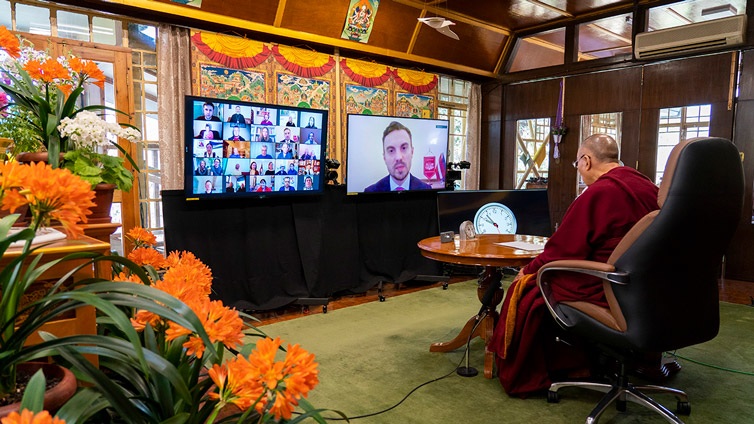
In his response, His Holiness explained,
“Although I have retired from any political responsibility, I remain committed to the preservation of Tibetan culture, which is a Buddhist culture. In the seventh century, the Tibetan emperor, despite close links with the Chinese emperor, chose to design a Tibetan form of writing modelled not on Chinese characters, but on the Indian Devanagari alphabet. A century later, the then Tibetan ruler invited a great philosopher and logician, Shantarakshita, from India to introduce Buddhism to Tibet. He instigated the translation of Buddhist literature, the Buddha’s actual teachings as well as the treatises of Indian masters who came after him, into Tibetan. This is the basis of the tradition that we continue to keep alive.
“The Tibetan Buddhist tradition is unique in the importance it places on the use of reason. It is a comprehensive tradition. It encompasses basic human values.
“I am also committed to preserving Tibetan ecology. Since the Tibetan plateau is the source of the major rivers of Asia, providing water for millions, preservation of Tibet’s natural environment, including its forests, is crucial.
“Since 1974 we Tibetans have not sought independence, but have expressed a willingness to remain with the People’s Republic of China. It can provide funds for development, while we can offer them Buddhist teachings. However, we must enjoy meaningful autonomy. I believe that eventually tight authoritarian control will crumble, but Buddhism will survive.
“I appreciate your friendship and support—thank you.”












